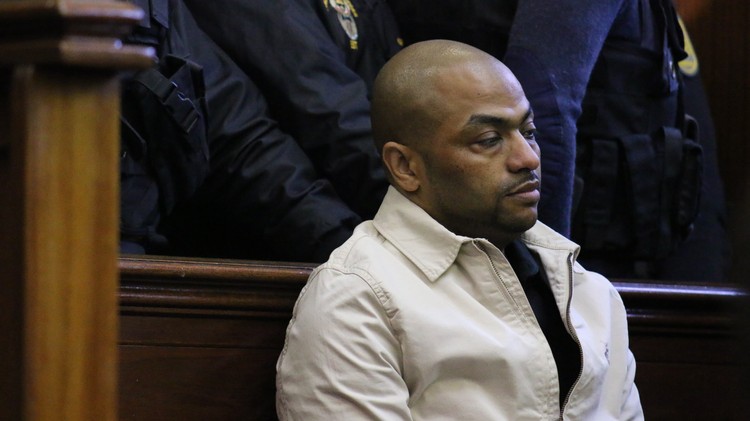Date set for Thabo Bester trial
Court proceedings so far this year have dealt with ironing out pre-trial matters
The date for the trial of murderer and prison escapee Thabo Bester, and his girlfriend Nandipha Magudumana, has been set down by the Bloemfontein High Court. Photo: Becker Semela
- The trial of Thabo Bester and co-accused has been set for 10 February 2025.
- Bester’s co-accused Nandipha Magudumana has challenged the jurisdiction of the South African courts to prosecute her, as she claimed she had been abducted from Tanzania.
- Bloemfontein High Court Judge Cagney Musi was not swayed by defence lawyers’ arguments.
The trial of convicted rapist and murderer Thabo Bester, his girlfriend Nandipha Magudumana, and several prison officials accused of helping Bester escape from prison in May 2022, has finally been set down for hearing.
The numerous appearances of Bester and Magudumana before court this year have been for pre-trial matters such as ensuring that all accused have legal representation, have they have funded lawyers, and that all relevant parties have received documents. On Wednesday, Bloemfontein High Court Judge Cagney Musi, tasked with handling the pre-trial proceedings, said the trial would begin on February 10, 2025.
But it might not be plain sailing before then. Both Bester and Magudumana have pending related applications which could impact trial proceedings.
It emerged at the hearing on Wednesday that Magudumana has successfully petitioned the Supreme Court of Appeal to hear an appeal against a high court ruling that denied her challenge to the jurisdiction of South African courts to prosecute her, claiming the South African authorities had abducted her from Tanzania.
Her counsel, Advocate Frans Dlamini, said Magudumana had filed her papers and it was likely the SCA would hear and decide the matter before the end of the year.
“It will have a bearing on the criminal case. Anything and everything is possible,” said Dlamini, arguing that the criminal matter should, possibly, be adjourned to another provisional date.
But State Advocate Amanda Bester urged the judge to set the trial date “otherwise it could go on for another year”.
In setting the February 2025 date, Judge Musi said the SCA hearing only affected Magudumana, and the other accused also had rights to a fair and speedy trial. After setting the date, he excused the other accused and their legal representatives, leaving Bester alone in the dock, and his newly-appointed advocate Lerato Moela on his feet, resulting in a lengthy back and forth between Moela and the judge.
Moela told the judge that Bester had now filed an application which concerned his constitutional rights to a fair trial.
In essence, Bester wants a court to order that his continued detention in solitary confinement, the restrictions on consultations with his legal team, the refusal by prison officials to allow him access to a laptop, and the fact that he is shackled when he comes to court, is unconstitutional. He claims this amounts to “torture” and wants orders directing “the State” to put a stop to it.
The point Moela made - over and over again - was that because Bester’s application involved fair trial rights, it should be heard by a criminal court, with Bester present.
But, the judge repeatedly pointed out, raising his eyebrows at times, that the application was not only “half-baked” because papers were outstanding, but was clearly a civil application which went far beyond fair trial rights, and in which punitive cost orders were sought against the respondents.
This, he said, had to be argued before a judge in a civil trial, where Bester was not required to be present.
“I can see no reason why he must be present. If you want the case locked into the criminal stream, because you want him to be present, then I can tell you now, if that is your game plan it is the wrong game plan,” Judge Musi told Moela.
He said he had read the papers, and they strayed “far beyond section 35 (of the Constitution)”.
“What you are asserting is there has been a cascade of failures by everyone from the police to the national commissioner of correctional services in the way he is kept, transported, what he eats and who prepares his food,” Judge Musi said, noting that Bester wanted the chef preparing his food to identify himself.
During the exchange, Judge Musi asked Moela several times: “Are you done?” He repeatedly told Moela he could raise his arguments in front of the judge assigned to hear the application when all the papers were filed.
“This is not an opportune time. That is how simple this is.”
Moela finally conceded.
“Then I expect you to sit down,” Judge Musi said.
Support independent journalism
Donate using Payfast

Next: How we know a new medicine is so effective at preventing HIV transmission
Previous: Joburg fire survivor pleads for help to recover his baby’s body
© 2024 GroundUp. This article is licensed under a Creative Commons Attribution-NoDerivatives 4.0 International License.
You may republish this article, so long as you credit the authors and GroundUp, and do not change the text. Please include a link back to the original article.
We put an invisible pixel in the article so that we can count traffic to republishers. All analytics tools are solely on our servers. We do not give our logs to any third party. Logs are deleted after two weeks. We do not use any IP address identifying information except to count regional traffic. We are solely interested in counting hits, not tracking users. If you republish, please do not delete the invisible pixel.

